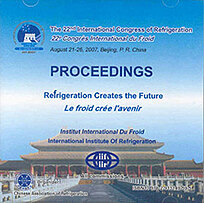
Document IIF
Une méthode alternative pour refroidir les composants microélectroniques utilisant le froid traditionnel.
An alternative method for the cooling of power microelectronics using classical refrigeration.
Auteurs : CHIRIAC V., CHIRIAC F.
Résumé
Classical refrigeration using vapour compression has been widely applied over the last decades to large scale industrial systems, with few known applications to the field of microelectronics cooling, due to the small size limitation. This study proposes an efficient mechanical refrigeration system to actively cool the electronic components populating a printed circuit board in a high-power microelectronics system. The proposed refrigeration system includes several miniaturized components (compressor, evaporator), designed to fit the smaller scale power electronics. The system is thermally optimized to reach high COPs. An array of micro-channels is used for the evaporator/condenser units. A previous study indicated that the R-134a refrigerant provides the best COP/feasibility ratio, while being the most suitable for microelectronics applications. The present study develops an analytical model of the proposed small scale vapour compression refrigerator using the R-134a refrigerant. The refrigeration system is thermally optimized for cooling powers ranging from 20-100 W, with the COP of the system reaching values up to 4.5.
Documents disponibles
Format PDF
Pages : ICR07-B2-58
Disponible
Prix public
20 €
Prix membre*
Gratuit
* meilleur tarif applicable selon le type d'adhésion (voir le détail des avantages des adhésions individuelles et collectives)
Détails
- Titre original : An alternative method for the cooling of power microelectronics using classical refrigeration.
- Identifiant de la fiche : 2008-0398
- Langues : Anglais
- Source : ICR 2007. Refrigeration Creates the Future. Proceedings of the 22nd IIR International Congress of Refrigeration.
- Date d'édition : 21/08/2007
Liens
Voir d'autres communications du même compte rendu (839)
Voir le compte rendu de la conférence
Indexation
- Thèmes : Systèmes à compression
- Mots-clés : Système frigorifique; R134a; Électronique; Microcanal; Refroidissement; Système à compression; Frigorigène; Composant
-
Vapour-compression refrigerator enabled thermal...
- Auteurs : RAO W., ZHOU Y. X., LIU J., et al.
- Date : 21/08/2007
- Langues : Anglais
- Source : ICR 2007. Refrigeration Creates the Future. Proceedings of the 22nd IIR International Congress of Refrigeration.
- Formats : PDF
Voir la fiche
-
Performance analysis of a miniature-scale vapou...
- Auteurs : TRUTASSANAWIN S., CREMASCHI L., GROLL E. A., et al.
- Date : 17/07/2006
- Langues : Anglais
- Source : 2006 Purdue Conferences. 18th International Compressor Engineering Conference at Purdue & 11th International Refrigeration and Air-Conditioning Conference at Purdue [CD-ROM].
- Formats : PDF
Voir la fiche
-
Optimization of the refrigeration machinery wit...
- Auteurs : ARADAU D., COSTIUC L.
- Date : 14/07/1998
- Langues : Anglais
- Source : Proceedings of the 1998 Purdue International Refrigeration Conference.
Voir la fiche
-
Optimization of vapour compression systems via ...
- Auteurs : RICHARDSON D. H., JIANG H., LINDSAY D., et al.
- Date : 16/07/2002
- Langues : Anglais
- Source : 2002 Purdue conferences. 2002 compressor engineering & refrigeration and air conditioning conferences at Purdue [CD-ROM].
Voir la fiche
-
Compact, low-temperature refrigeration of micro...
- Auteurs : COGGINS C., GERLACH D., JOSHI Y., et al.
- Date : 17/07/2006
- Langues : Anglais
- Source : 2006 Purdue Conferences. 18th International Compressor Engineering Conference at Purdue & 11th International Refrigeration and Air-Conditioning Conference at Purdue [CD-ROM].
- Formats : PDF
Voir la fiche
